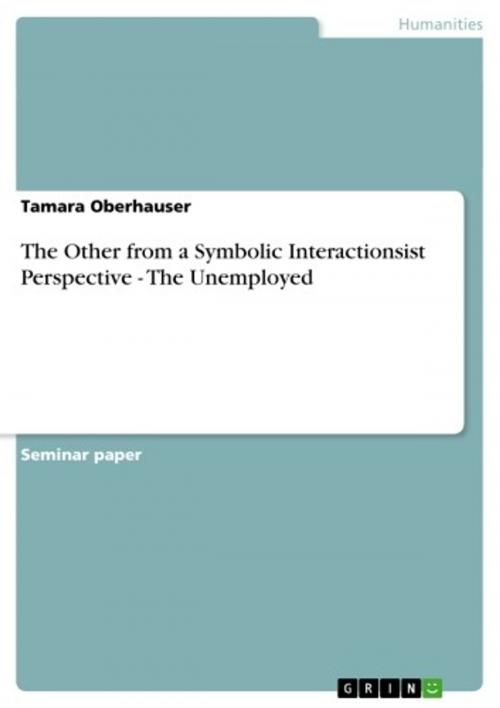The Other from a Symbolic Interactionsist Perspective - The Unemployed
The Unemployed
Nonfiction, Social & Cultural Studies, Social Science, Sociology| Author: | Tamara Oberhauser | ISBN: | 9783638352567 |
| Publisher: | GRIN Publishing | Publication: | February 24, 2005 |
| Imprint: | GRIN Publishing | Language: | English |
| Author: | Tamara Oberhauser |
| ISBN: | 9783638352567 |
| Publisher: | GRIN Publishing |
| Publication: | February 24, 2005 |
| Imprint: | GRIN Publishing |
| Language: | English |
Seminar paper from the year 2003 in the subject Sociology - Work, Profession, Education, Organisation, grade: A = 1,0, Uppsala University, course: Symbolic Interactionism, 5 entries in the bibliography, language: English, abstract: In these days the job situation in Germany is seriously bad. More than 4.3 million people are out of work, no matter what level of education they have. The situation in Eastern Germany, where there is an unemployment rate of up to nearly 20% is even worse, particularly for young people under 20, of whom 9.1% are unemployed (cf. Statistisches Bundesamt Deutschland). Although this is mainly a political and economical issue, the social importance of unemployment must not be neglected as realities of jobless people can be drastically altered , especially for those, whose life career was dominated by their work, no matter if they were in high or low positions. As Symbolic Interactionism is in the first place a theory about the everlasting process of social interaction between human beings, the unemployed individual in context to society seems to be worth discussing in this theoretical perspective. So, this essay deals with the unemployed individual in society and their perception of reality during the phase of unemployment related to the main ideas of Symbolic Interactionism found in the book The Social Construction Of Reality. A Treatise in the Sociology of Knowledge by P. Berger and Th. Luckmann first published in 1966. This book serves as aconception of the sociological theory of Symbolic Interactionism and its theoretical development. The first chapter summarizes the major points of Symbolic Interactionism and chapter two deals with the idea of the 'Other' within this theoretical approach. The third chapter examines the unemployed individual relating to their objective and subjective reality. Finally, chapter four presents the consequences of reality perception by unemployed individuals through social interactions and their relevance to society.
Seminar paper from the year 2003 in the subject Sociology - Work, Profession, Education, Organisation, grade: A = 1,0, Uppsala University, course: Symbolic Interactionism, 5 entries in the bibliography, language: English, abstract: In these days the job situation in Germany is seriously bad. More than 4.3 million people are out of work, no matter what level of education they have. The situation in Eastern Germany, where there is an unemployment rate of up to nearly 20% is even worse, particularly for young people under 20, of whom 9.1% are unemployed (cf. Statistisches Bundesamt Deutschland). Although this is mainly a political and economical issue, the social importance of unemployment must not be neglected as realities of jobless people can be drastically altered , especially for those, whose life career was dominated by their work, no matter if they were in high or low positions. As Symbolic Interactionism is in the first place a theory about the everlasting process of social interaction between human beings, the unemployed individual in context to society seems to be worth discussing in this theoretical perspective. So, this essay deals with the unemployed individual in society and their perception of reality during the phase of unemployment related to the main ideas of Symbolic Interactionism found in the book The Social Construction Of Reality. A Treatise in the Sociology of Knowledge by P. Berger and Th. Luckmann first published in 1966. This book serves as aconception of the sociological theory of Symbolic Interactionism and its theoretical development. The first chapter summarizes the major points of Symbolic Interactionism and chapter two deals with the idea of the 'Other' within this theoretical approach. The third chapter examines the unemployed individual relating to their objective and subjective reality. Finally, chapter four presents the consequences of reality perception by unemployed individuals through social interactions and their relevance to society.















